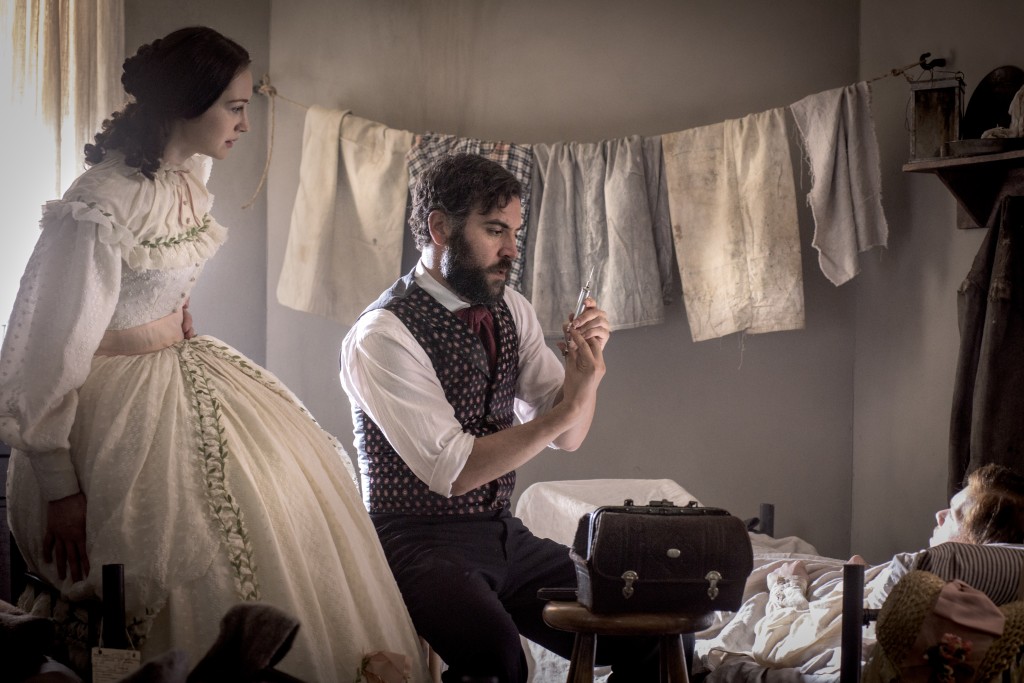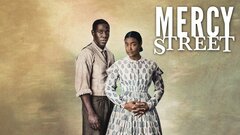Josh Radnor Gets Bloody Serious in the Civil War Series ‘Mercy Street’

His eyes have seen the glory! Josh Radnor sure wasn’t typecast as a funnyman after his hip, hot sitcom How I Met Your Mother ended its run in 2014. First he hit Broadway in Disgraced, a Pulitzer Prize-winning drama about Islamophobia. Now he’s hacking off limbs and fighting morphine addiction as Civil War surgeon Jedediah Foster in the epic PBS series Mercy Street, premiering Sunday, Jan. 17.
Though Dr. Foster can sometimes be an irony-spouting smartass, in a M*A*S*H* sort of way, this is a startling departure for you. How important was that?
I’d be a fool not to be grateful for How I Met Your Mother, but my directive in taking a role these days is, “Have I done this already?” If something feels energetically like HIMYM, I tend to pass. And Mercy Street is good for me on a personal level. We’re all so burdened by our own perspective on things, and this gave me a great exercise in empathy. These people truly lived through hell. Plus, I get to have a beard. [Laughs] The Civil War was an extremely wacky moment in facial-hair history.
RELATED: Scoop on Other New and Returning Shows
The series looks at the war through the lives of doctors and nurses. What new insight does that give us?
When you see the blood and the guts and realize more soldiers died of infection and disease than on the battlefield, the war ceases to be metaphorical. The Civil War needs to feel real and relevant because, as Ken Burns says, it’s still being fought in this country on some level. Check the headlines. You can’t understand our nation unless you understand the war between the North and South.
Yet the characters in this story—set just a year into the war—don’t really understand the conflict themselves. They consider it more of a disturbance. How was it to play such naiveté?
It was heartbreaking. In 1862, people had no idea they were being ground up in the gears of history. You hear characters actually say, “The war will be over in a couple of months.” They have no idea of the tragedy, the carnage, the storm cloud that lies ahead and what a protracted struggle the war will be. There is something so dramatically poignant seeing people not be able to contextualize what they’re a part of. As an actor, you have to leave your own knowledge of history at home and become sort of clueless. We’re playing people who think of this war as a hiccup.
We’ve been led to believe that medical practices during the Civil War were pretty damn barbaric, but that’s not really the case in this series. What’s up with that?
There is this widely perceived idea that there was no anesthesia back then, that soldiers were biting down on bullets as their arms and legs were being chopped off. But that wasn’t the case. There was chloroform. There was ether. Yes, it was still several years before Lister and Pasteur and the understanding of microbes and bacteria, but the Civil War was when western medicine started to take hold and that’s really exciting to play. It was actually a time of great advancement. Nothing to be nostalgic about, of course. It was still horribly harrowing.
Maybe we better mention that there’s also lots of sex, intrigue and laughs in this show!
Yes! The worry when you do a period piece is that it will feel like a museum exhibit, a diorama behind glass that’s not vital or urgent. But [exec producers] David Zabel and Lisa Wolfinger created something that throws you right into the times with humor and caustic wit that feels recognizable without being anachronistic. David ran the series ER for years, so you can certainly see the influence of that show. Mercy Street is quite a smart mashup.
It’s also the first new drama created by PBS in over a decade. Why the dry spell?
They import all these great historical dramas like Downton Abbey, but now they want to say, “We can do this, too!” There’s always this feeling that the Brits do drama better than Americans do. Not true. Hey, I’m not trying to stoke another war with England here, but we’re just as good at it!
Mercy Street, Series premiere, Sunday, Jan. 17, 10/9c, PBS (check local listings at pbs.org)







